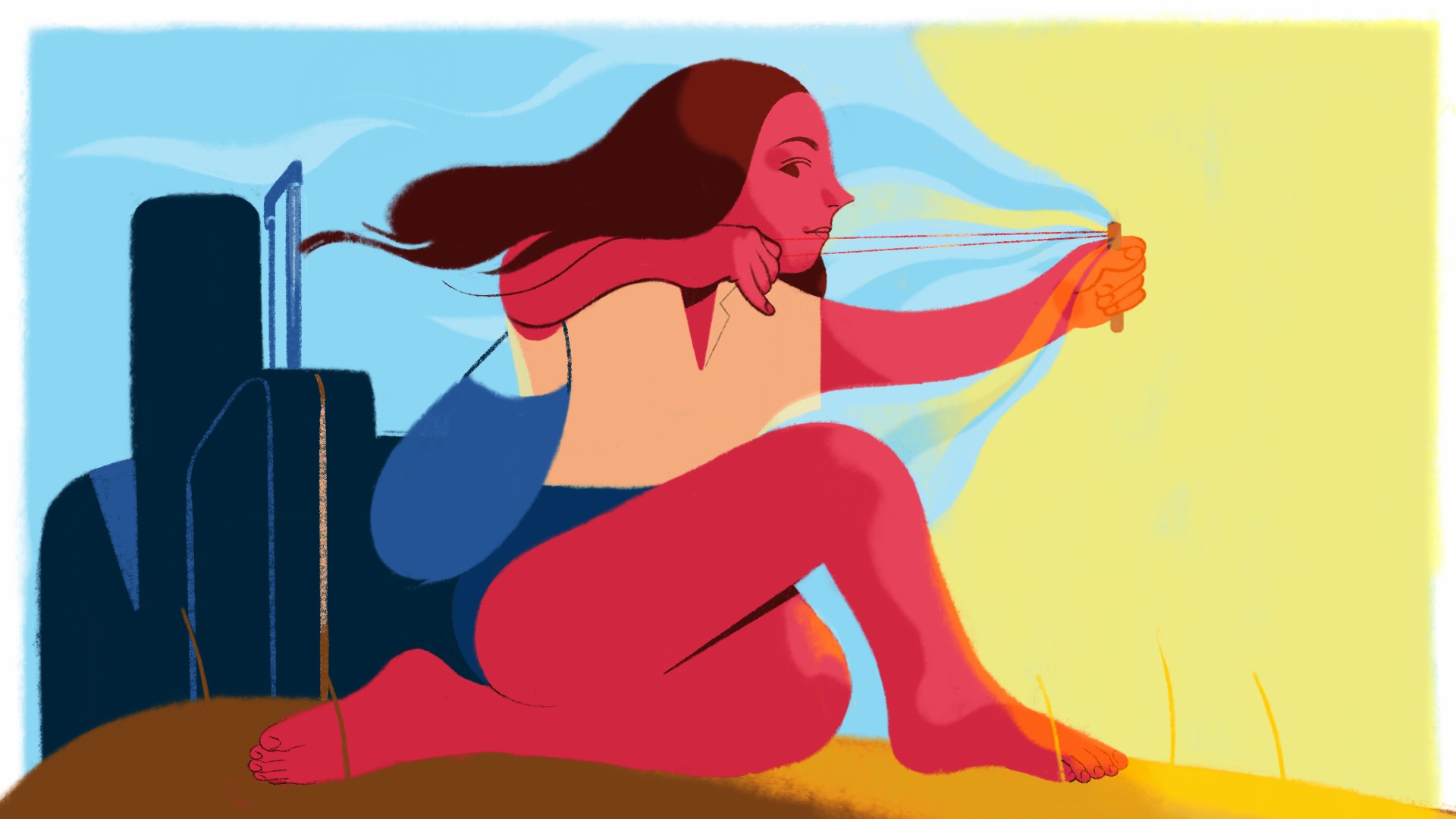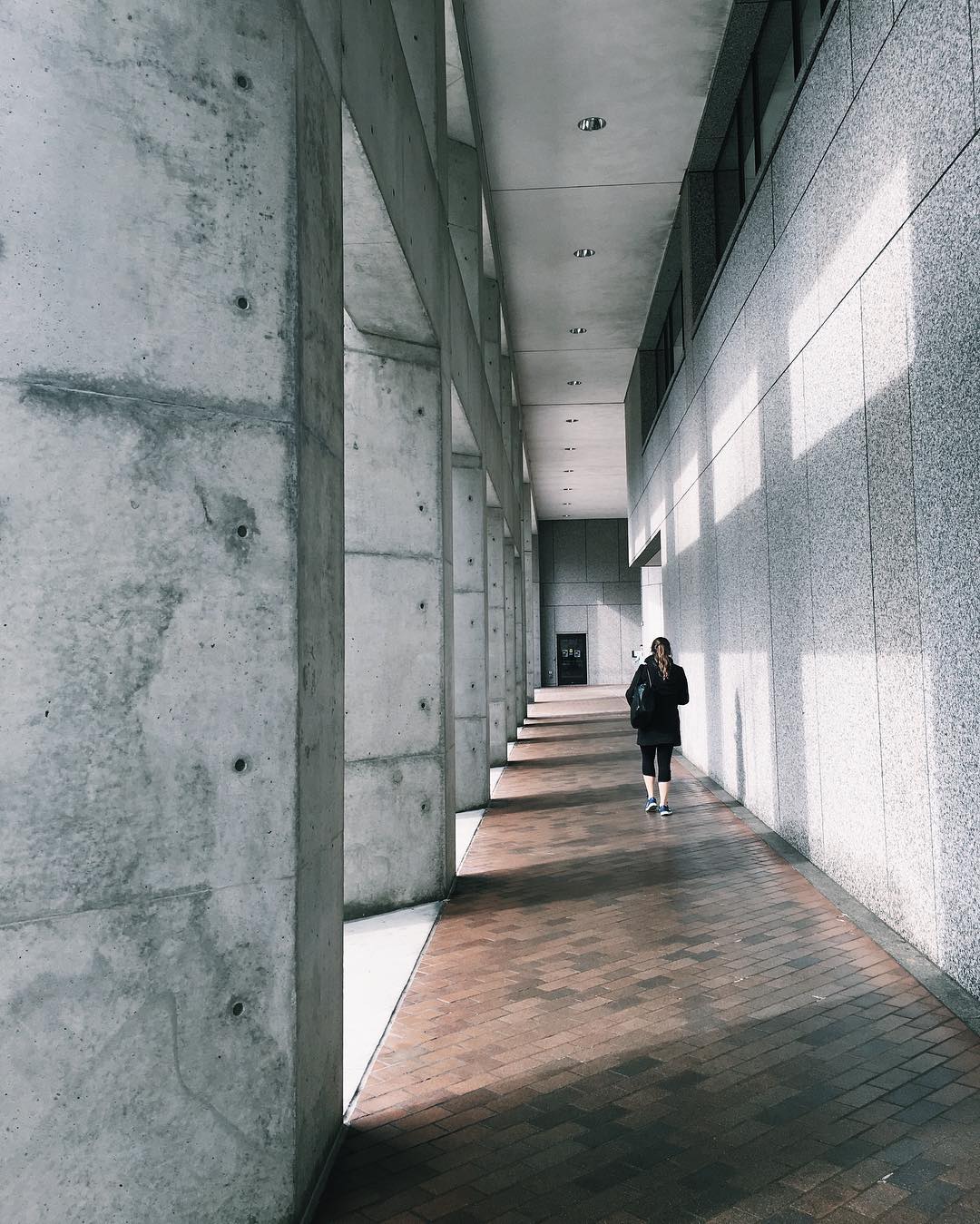At the culmination of Greta Gerwig’s Lady Bird, the title character leaves a voicemail for her mother that doubles as an ode to Sacramento, her hometown, across the country from Lady Bird’s college in New York City. As I imagine the filmmakers intended, tears bit the back of my eyes as Lady Bird’s voice overlaid images of California on the screen. I wasn’t sure exactly where the tears were coming from—the scene with the most raw emotion, in which Lady Bird’s parents leave her at the airport, had already passed. But Lady Bird’s expression of love for Sacramento (and, by extension, her mother) felt poignant in a small and neat way, like a well-placed line at the end of a poem.
This kind of nostalgia is a recurring theme in our culture, with plenty of lyrics and platitudes to describe it: Absence makes the heart grow fonder. You don’t know what you’ve got till it’s gone. Or the only bit of Hemingway I ever feel like quoting: “Maybe away from Paris I could write about Paris as in Paris I could write about Michigan.” I like to picture Hemingway at the original Shakespeare & Company, enveloped by the romantic streets of Paris’s Latin Quarter, thinking only of blue, saltless Little Traverse Bay.
At the culmination of Greta Gerwig’s Lady Bird, the title character leaves a voicemail for her mother that doubles as an ode to Sacramento, her hometown, across the country from Lady Bird’s college in New York City. As I imagine the filmmakers intended, tears bit the back of my eyes as Lady Bird’s voice overlaid images of California on the screen. I wasn’t sure exactly where the tears were coming from—the scene with the most raw emotion, in which Lady Bird’s parents leave her at the airport, had already passed. But Lady Bird’s expression of love for Sacramento (and, by extension, her mother) felt poignant in a small and neat way, like a well-placed line at the end of a poem.
This kind of nostalgia is a recurring theme in our culture, with plenty of lyrics and platitudes to describe it: Absence makes the heart grow fonder. You don’t know what you’ve got till it’s gone. Or the only bit of Hemingway I ever feel like quoting: “Maybe away from Paris I could write about Paris as in Paris I could write about Michigan.” I like to picture Hemingway at the original Shakespeare & Company, enveloped by the romantic streets of Paris’s Latin Quarter, thinking only of blue, saltless Little Traverse Bay.
As a child I internalized this; I lived in fear of not knowing what I was missing until it was too late. I wrote somber essays in my journal about the symbolism of trick-or-treating for the last time and watching my childhood slip through my fingers; little did I know that the day would come, quite soon in fact, when I had no interest in trick or treating whatsoever. In one of my favorite Peanuts comic strips, Charlie Brown imagines “security” as the experience of sleeping in the backseat of a car while your parents drive. “You don’t have to worry about anything. Your mom and dad are in the front seat and they do all the worrying…they take care of everything…” he tells his friend Peppermint Patty. “But it doesn’t last. Suddenly, you’re grown up, and it can never be that way again!” I discovered this comic strip when I was still young enough that my dad would carry me inside to bed if I fell asleep in the backseat after a long drive. The irony—that even as a child, Charlie Brown is still worrying all the time—was lost on me.
I knew, from the age of six, that I wanted to write. But everyone said write what you know, and I didn’t think I knew anything—except that, as a kid, I was deep in the good and easy part of life, and, so I’d heard, it would only get harder and sadder.
So I wrote poems about it.
At fourteen I wrote myself instructions:
Stretch your childhood
Like a rubber band.
Lassoing each coming year,
And let your youth fly
As far as it can.
On my sixteenth birthday I was feeling especially dark:
Suddenly cable-knit sweaters and well-known teacups
aren’t enough to warm you from the chill that comes from realizing
you are just a death-bound cog in a rusting machine
Later, at age sixteen:
Maybe I’m going somewhere but I feel like
a baby zipped inside teenage skin-
I’m really only looking for childhood
when the colors and sounds were
softer.
At seventeen I couldn’t understand where the time had gone:
Seventeen is no age
of mine
it is the number of times
you blink before fully waking
the number of bricks
on the path to my front door
the number of questions
that come so easily in the dark
whispers like snowflakes from my sleeping mouth
And so when it came time to move away from my birthplace, Ann Arbor, I acted out my nostalgia almost in advance. I wanted to leave for college, but I tried to plan out ways I might end up in Ann Arbor again one day, to raise my own kids. It felt like the perfect place to grow up: small enough to feel embedded in a web of community; large enough to not feel stifled. United in the collective effervescence of football fandom, but equally preoccupied with poetry, theatre, and student journalism. My public magnet high school, where we called teachers by their first names and shepherded ourselves to class without bells, used the motto “small school, open minds.” A few blocks from my house, Nichols Arboretum unfolded between our neighborhood and UofM’s campus, offering miles of woods and meadows and woodchipped paths where I could run after school, occasionally passing picnicking students, families walking dogs, or schoolmates passing around joints. Even when I was unhappy, I knew I was lucky.
As a result, I approached my impending departure with a seriousness that bordered on melodrama. During senior year creative writing class, I read aloud my “Sestina for the Last Fall,” describing my last autumn at home. (Sample lines: “Can I count on the year to circle/back here? For the leaves to drift down somewhere far from our/city?”) After I’d finished, a girl raised her hand and said, “Uh, are you going somewhere where they don’t have fall?”
“No,” I said, surprised. “But I’m leaving Ann Arbor!”
As it has for many others, the Me Too moment has left me scanning my past, remembering the scattered pieces of assault and harassment. I started this mental work about two years ago; until then it had never occured to me that any of my experiences could qualify as sexual misconduct. But the events of the past year have necessarily sped up and intensified the work. The images and scenes play on repeat. The doubts seem to have new urgency: Are you sure it happened that way? Why care about this when others have experienced worse?
And Ann Arbor, as my mind again and again rolls over the contours of my adolescence, looks different, its environment newly tainted. While preparing for a concert with my middle school band—one of Ann Arbor’s award-winning music programs—a classmate humiliated me when he touched my butt in front of everyone without me noticing. In that same middle school, other girls and I delighted in branding each other “sluts.” One day, in an effort to fit with beauty standards I hadn’t yet grown into—tired of being teased about my looks by guy “friends” in my class—I wore a new padded bra and tight Hollister shirt to school. I later found out that the boys in my Latin class had spent the whole period laughing and passing notes about how I “stuffed my bra.” (Ten years later, the sting of humiliation is long gone, but I’ve never felt comfortable wearing a padded bra since.)
Or what about the bougie neighborhood pool club, where I splashed around in failed diving lessons and shared frozen Coke slushies with the best friend who took me under her wing in a new neighborhood? When a bunch of us snuck into that same pool during an end-of-high-school party and went swimming, a boy grabbed me, lifted me, and pressed his lips to mine before I even had a chance to think about whether I wanted it. Caught off guard and unsure what to do, I kissed him back in front of everyone, and was subject to the taunts and jeers of the other boys all night, earning the nickname “[X]’s girl.”
I took for granted that my Ann Arbor Jewish community was sacred, familiar, and safe. In fact, my friends on the youth group board encouraged me to join them at “board bonding”—code for hangouts where everyone got trashed— because I wouldn’t want to drink for the first time in an “unsafe” environment. Yet it was at a Jewish co-ed sleepover that the hot older exchange student grabbed me in the middle of the night and wouldn’t stop holding me even when I rolled away. It was at a “board bonding” trip when a friend climbed into my bed in the middle of the night in our cabin, armed with a ridiculous excuse about why he couldn’t sleep in one of the cabin’s ten empty beds, not leaving until I firmly said no several times. During a hookup, another boy from the community tugged and tugged at my zipper, begging to take my shorts off even as I said no, no, not right now, not this time. There are more stories. You get the idea.
It took me a long time to learn to drive. At the helm of a giant machine, I felt small and inept. One time, while driving with my dad on my permit, I was pulled over for going too slow. For the first few drives on my own, after finally getting my license, my heart clanged as I obsessed over every turn. Within a few months, though, I had discovered the beauty of driving through my hometown at night alone, my mix CDs and Ingrid Michaelson album rotating in the dark, few others on the road but me and my thoughts.
For me and many other women I know—especially those who of us work in media and rarely go a day without scrolling through Twitter—the reverberations of Me Too have been exhausting, painful, infuriating. Yet for me there is something good about it. Thinking over things feels like dabbing antiseptic on a wound, a path to some ultimate healing. For so long, the incidents of my childhood inspired overwhelming shame and self-blame. If someone asked me to prom, I owed them a hookup; wasn’t I a bitch for refusing? Why did I panic when a hot guy grabbed me in the middle of the night—shouldn’t I have been glad? Now, I know all the things I didn’t then. Again and again I tell my younger self: You don’t owe anyone anything! It wasn’t your fault! You deserved better. A decade’s worth of shame seems to float off of my shoulders. I am almost addicted to that feeling of relief: so I think about it, I think about it, I think about it.
In journalistic and academic writing, one of the biggest crimes is the overuse of the passive voice. You are not to say “I was taken advantage of” because this is an unforgivable omission: it allows the subject to hide. It is a cop-out that allows you to skate by on less research, without clarifying who exactly did what. I am not supposed to say “I was assaulted” if I am not prepared to say “He assaulted me.” But something in me still resists the latter phrasing. Some of the boys mentioned here I have long lost track of in the world; some are longtime friends with whom I still exchange pleasantries. None of them feel like central characters in the story; none of them feel easy to blame. After all, they were working with the same script I had, a script that framed sexual activity as a game, in which men would inevitably try to take things from me and I would have to decide whether to fend them off. If I thought that’s just the way it goes, is it a surprise that they did, too?
Concerns about these ambiguities have pervaded the public conversation throughout the Me Too era, coming to a head in the (often unbearable) debate over Babe.com’s story about Grace and Aziz Ansari, or in the viral storm following the publication of Kristen Roupenian’s fiction piece “Cat Person” published in the New Yorker in January. The story describes a very brief courtship between Margot, a college-age woman, and Robert, an older man, including a hookup that Margot goes along with but later regrets. “Cat Person” took off, I think, because it gave voice to an inner monologue that many of us have clearly felt but always assumed was private and inscrutable. In particular, I was struck by the section in which Margot, after having gone home with Robert, decides she might not want have sex with him after all:
The thought of what it would take to stop what she had set in motion was overwhelming; it would require an amount of tact and gentleness that she felt was impossible to summon. It wasn’t that she was scared he would try to force her to do something against her will but that insisting that they stop now, after everything she’d done to push this forward, would make her seem spoiled and capricious, as if she’d ordered something at a restaurant and then, once the food arrived, had changed her mind and sent it back.
I know I was blown away by this paragraph, not because it’s the most beautiful example of English prose I have ever read, but because I have felt this way countless times and never expected to see a description of that feeling staring back at me in the pages of the New Yorker. That complex conversations about sex, agency, and gender—the kinds of conversations I had with female friends at late-night wine nights near the end of college—are emerging into the public sphere feels like progress.
But progress can come with missteps and costs. In a thoughtful piece in last month’s issue of The Point, Anastasia Berg levels a critique at the ease with which Roupenian, in interviews, named Robert the villain, and the ease with which the reading public, in turn, gobbled up that narrative. Berg argues that this interpretation conflicts with the actual story, in which moral distinctions are murky and Robert is sometimes sympathetic. Furthermore, Berg says, Roupenian’s characterization of Margot as innocent, ending up in this situation accidentally, is dangerous, Berg says. We are so enthralled by the story because we can build a narrative of ourselves as Margots, she says, a narrative too clean to represent the complex mechanisms of human interaction. Of Margot, Berg says, “But perhaps after all she is only what we wish we were or could be: beautiful, naïve, faultless. Complicit in the sacrifice of our own desire and pleasure, only insofar as we cared too much. Too good for our own good.”
Berg’s essay struck me because it gets at many of the disquieting questions swirling in my own head over the past few months. When I read Cat Person, my identification with Margot wasn’t also a condemnation of Robert. I didn’t blame Margot for feeling unable to voice her needs, or for not knowing how to write Robert the transparent rejection message he deserved. I don’t necessarily blame Robert, either, who did not implant Margot with the internalized patriarchy that kept her doing something she didn’t want to do. I blamed him for calling her a whore, which is stupid, mean, and misogynistic, though probably not something that forever consigns a person to the trash bin of humanity. But, I asked, why, why, is my heart so insistently sympathetic with Robert? And what does that say about my larger outlook on my own experiences: why am I so willing to absolve the boys who hurt me? (Even writing that phrase—”they hurt me”—feels melodramatic and off-base.) Am I empathizing too deeply? Wasn’t I doing the same thing at the time, scared of making boys feel bad by insisting they leave me alone, even as they gave much less consideration to what I wanted? Why, then, do I still care, do I insist on being nice?
It feels good, to righteously ask myself these questions. Because why should I have to be concerned with the Roberts of the world? Why not put myself first, for once; why not completely condemn the men responsible for violating my boundaries? But that would be seeing myself as Margot, and following Berg’s framework, participating in a self-delusion that makes me feel better but gets me no closer to seeing the world as it is. Here arises the fear that I have in even writing about this: that I’m making it into something it isn’t, that I’m unnecessarily absolving myself because it feels good. (Again! That addictive feeling of relief.) After all, I now spend my free time reading feminist essays and still find it hard to be assertive with men who approach me on the street, or the subway, or at a bar. And like Margot, I still start things with men that I don’t want to finish and I can’t seem to figure out how to get out of them. At a certain point, isn’t this just an example of my own failings? At this point, what else is there to blame?
These questions are exhausting to ask and harder to answer, and I am far from being in a position to offer any sort of grand conclusion. But, as is often the case, there is probably some middle ground. I have long dismissed the stresses of my childhood because all of my problems seemed minimal and bourgeois— my privilege overwhelming enough to smooth over any cracks—an evaluation that still mostly checks out. But the sunshine-and-rainbows vision of Ann Arbor that I knew can no longer hold, not now that I realize how much misogyny, and hurt, pervaded my coming of age there. At the same time, I can’t erase the tape and write in a new past (or even a new present) in which I was only the witless victim, waiting to be preyed upon by all-powerful boys. Because isn’t that just another form of nostalgia, another colored film sliding over my glasses? And what of the world will that fix? The truth is, of course, that in many ways I was lucky, and in many ways I was not, and there were times that I should have known better, and many times where it wasn’t my fault that I didn’t. My life, after all, is not folktale or fable: it’s just a life.
What I can say is that there is a huge difference between where I am now and where I was at 14, or 15, or 17, when I thought I owed things to men and that they owed me little. Of course, the instances of harassment didn’t stop after I left childhood behind. The big city brings new challenges: a man who wouldn’t stop talking to me on the train and decided to get off with me at my stop; a source who pestered me with romantic advances while I tried to interview him. Still, at least now I know that this isn’t fair. I know that it’s not “bitchy” to express what I want and say no to what I don’t want; I know that my pleasure is supposed to matter, too.
Some days the gap between what I know I’m allowed to demand and what I can bring myself to say feels like a mile-wide ravine, impossible to bridge. But I never want to go back to the girlhood years of stumbling around, seeing no alternative to the patriarchal codes and dances I’d been handed. Of course, it’s not enough, but simply knowing that I deserve better has made an unmistakable difference: ultimately, it’s what keeps me willing to pursue romantic relationships with more hope and less fear.
Learning to look at the world through a cynical lens might seem like a casualty of growing up: a loss of innocence, as they say. But for a girl in this world—even in a liberal enclave like Ann Arbor—innocence is a liability, and by consequence so is youth. I would have traded away my innocence much sooner to be spared the shame of blaming myself for what patriarchy wrought, and to be assured that there was another pathway into sexual relationships, one lit by mutual respect and mutual comfort. The younger poet in me was right, that the colors and sounds were once softer, but there are advantages to being worn. So many nights spent reading my dog-eared Peanuts treasury by lamplight, hoping my parents wouldn’t notice I was still awake. I really thought Charlie Brown and I understood each other. How was I to know how good the driver’s seat can feel?
I’ve spent my whole life dreading the next step, overwhelmed by how much there is to miss. It’s not wrong to know how much I have, to hold it tight in my hands while I can. Ann Arbor is still home to some of the people I love most in the world. I will never tire of running through Nichols Arboretum, greeting the Huron River at the bottom of the hill like an old friend. But how much less poetic—and how much healthier!—it has been to realize that preemptive nostalgia is sometimes just premature. I still write poems, but haven’t composed a lament on my birthday in years. Sometimes I even wonder if the best is ahead.

 Boston College O’Neill Library taken by Carolyn Freeman
Boston College O’Neill Library taken by Carolyn Freeman The Embarcadero, San Francisco taken by Carolyn Freeman
The Embarcadero, San Francisco taken by Carolyn Freeman Shaw, Washington, D.C. taken by Carolyn Freeman
Shaw, Washington, D.C. taken by Carolyn Freeman